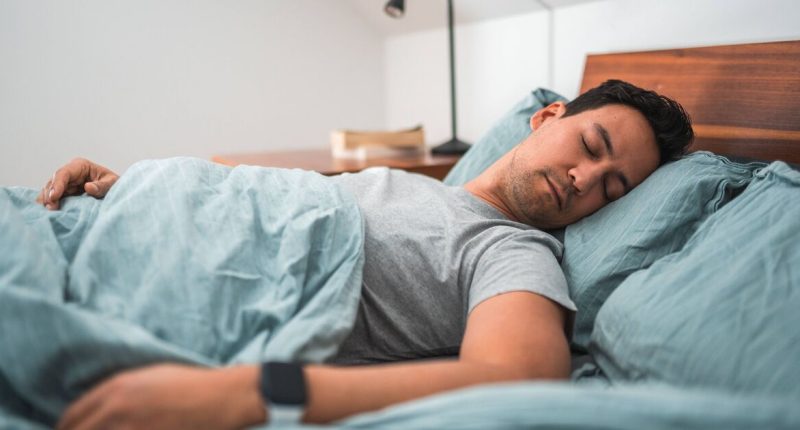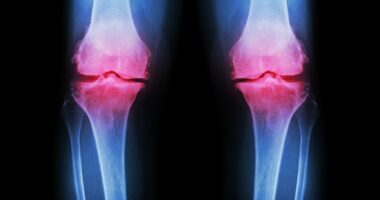Share this @internewscast.com
Falling asleep to the soothing sound of white noise could lead to a future health problem, especially if one ‘crucial’ mistake is made, according to a neurologist. The brain expert has warned that people might be risking a potential dementia diagnosis down the line in the pursuit of better sleep.
Dr Baibing Chen, popularly known online as Dr Bing, said that he avoids three activities before bedtime to ensure a restful slumber, and amongst them is one involving a common sleep device. He said: “I don’t blast my white noise machine. Not all of you use white noise machines, but if you do, I get it. I use one.
“You’re probably trying to block out traffic, your partner’s snoring or your dog licking his paw at 2am. But, if it’s [set] too loud, this can actually lead to hearing damage over time. And, as I have mentioned in previous videos, hearing loss is one of the biggest risk factors for dementia later in life.”
Although many believe white noise aids sleep and is harmless, there’s no concrete evidence linking it directly to increased dementia risk, reports Surrey Live. However, some studies suggest that prolonged exposure to noise pollution, including excessive white noise, could be associated with an increased risk of dementia.
Dr Bing, who previously issued a similar warning about headphones being too loud, recommended setting any noise machine to a maximum of 50 decibels. In addition, it is important to maintain a safe distance from your bed to avoid close contact with the constant noise.
Research has found that a distance of “at least 30cm” is optimal for children exposed to white noise. The study also highlighted the need for further research to fully understand the link between early noise exposure and hearing loss.
Hearing loss can lead to social isolation and cognitive decline, both known risk factors for dementia. It’s important to clarify that dementia does not directly cause hearing loss, but it could heighten the risk of developing the condition.
According to the Alzheimer’s Society, people who experience hearing problems in mid-life (aged 40–65) are at a higher risk of developing dementia. It could also be one of the early signs of dementia.
A spokesperson added: “Many people start to lose their hearing as they age, though they may not notice it initially. To reduce the risk of dementia, it’s crucial to have your hearing tested. There is some evidence that using hearing aids may reduce the risk of certain aspects of cognitive decline.”
What exactly is white noise, and can it aid in better sleep?
The Sleep Foundation describes white noise as a type of “broadband noise” that encompasses all audible sound frequencies. The hissing static of an untuned radio or TV and the gentle humming of a fan are commonly regarded as white noise.
Research has been shared with mixed results when examining the effectiveness of white noise in promoting better sleep. Certain studies revealed that white noise helped newborn babies fall asleep more quickly, as well as adults living in noisy areas of New York City drift off faster and enjoy improved sleep quality.
However, in some instances, the presence of white noise actually disturbed some people trying to fall asleep. These reports suggest that its benefits may depend on personal preferences and specific circumstances.
Although excessive exposure to loud white noise may pose health risks, there is a lack of conclusive evidence linking moderate use of white noise for sleep to dementia. Nevertheless, prolonged exposure to chronic noise can potentially lead to hearing loss, which has been strongly associated with an increased risk of dementia if left untreated.
How can I use white noise for sleep?
White noise machines can be purchased as standalone devices from retailers such as Amazon. However, a more cost-effective alternative might be to utilise a smartphone app, with a range of options available on the Apple App Store or Google Play Store.
YouTube also offers a variety of white noise videos that play for extended periods. It might be worth experimenting with different coloured noises – such as pink, brown or green.
If you enjoy the sounds of nature, pink noise may better suit your needs, as examples of this type of soothing noise come from the likes of rain, waterfalls and flowing rivers. The Sleep Foundation claimed that some therapists often use pink noise as a tool to treat hearing disorders or ringing in the ears – like tinnitus.
What help is available for sleep problems?
Sleep issues are common, and the reasons behind our struggles with sleep are likely to evolve over time. Factors such as illness, work stress, or having a newborn could potentially disrupt sleep.
A few restless nights are typically not a cause for concern, but sleep deprivation can become problematic if it begins to impact one’s daily routine. The NHS provides several home remedies to improve poor sleep, along with an online self-assessment tool. If sleep problems begin to interfere with your day-to-day life or cause distress, it’s best to call NHS 111 or consult your GP.
















